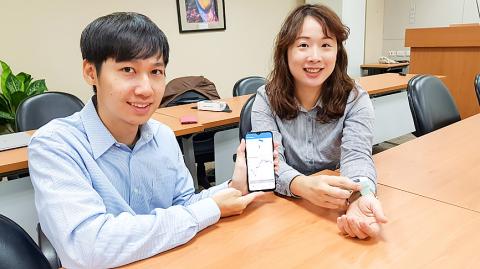A team of researchers yesterday unveiled an artificial intelligence (AI)-assisted blood flow volume sensor for people receiving hemodialysis to help allow early treatment when arteriovenous fistulas become obstructed.
The sensor, developed through six years of effort, was introduced by Paul Chao (趙昌博), a distinguished professor in National Chiao Tung University’s department of electrical and computer engineering, at a news conference at the Ministry of Science and Technology in Taipei.
The number of people receiving dialysis last year reached a record 90,000, with their medical costs totaling NT$44.9 billion (US$1.47 billion), Chao said, citing Ministry of Health and Welfare data.

Photo: Chien Hui-ju, Taipei Times
Taiwan, which is often called the “island of dialysis,” has much lower dialysis costs than other nations, but patients still need to visit a hospital three times a week and spend more than NT$600,000 per year for the treatment, Shin Kong Wu Ho-su Memorial Hospital dialysis center director Lin Bing-shi (林秉熙) said.
An arteriovenous fistula, which is created surgically in people with kidney disease to connect their blood system to a dialysis machine, is the “lifeline” of a dialysis patient, and it might cause complications, or even death if it is blocked, he said.
To help patients monitor their blood flow volume, the team developed a non-invasive sensor using photoplethysmography (PPG) — an optical measurement method — along with a mobile app that can be connected to hospital systems, Chao said.
Existing sensors are either invasive or ultrasonic, which have to be operated by medical professionals, he said.
By comparison, the new sensor — which is smaller than a smartphone — allows patients to take measurements at home, and the test result can be viewed on the mobile in 10 seconds, Chao said.
Chao last month received the Sensors Council Technical Achievement Award in the field of Sensor Systems or Networks for the new sensor.
The award is presented by the US-based Institute of Electrical and Electronics Engineers.
While PPG is not a new technique, the team employed a special wavelength to measure blood volume changes without hurting patients, and it also developed a special circuit and an AI model to process the signals, said Shawn Hsu (徐碩鴻), director-general at the ministry’s Department of Engineering and Technologies.
The collaboration between the medical and electronics fields would benefit people receiving dialysis — a less-charted area for technological innovation, Hsu added.
The team would start mass producing the sensor and hopes to keep its cost under a few thousand New Taiwan dollars, Chao said.
The system has collected nearly 200 pieces of data from medical centers, with a precision of 91 percent, he said, adding that it needs to collect more data to obtain the Food and Drug Administration’s approval.

The manufacture of the remaining 28 M1A2T Abrams tanks Taiwan purchased from the US has recently been completed, and they are expected to be delivered within the next one to two months, a source said yesterday. The Ministry of National Defense is arranging cargo ships to transport the tanks to Taiwan as soon as possible, said the source, who is familiar with the matter. The estimated arrival time ranges from late this month to early next month, the source said. The 28 Abrams tanks make up the third and final batch of a total of 108 tanks, valued at about NT$40.5 billion

Travel agencies in Taiwan are working to secure alternative flights for travelers bound for New Zealand for the Lunar New Year holiday, as Air New Zealand workers are set to strike next week. The airline said that it has confirmed that the planned industrial action by its international wide-body cabin crew would go ahead on Thursday and Friday next week. While the Auckland-based carrier pledged to take reasonable measures to mitigate the impact of the workers’ strike, an Air New Zealand flight arriving at Taipei from Auckland on Thursday and another flight departing from Taipei for Auckland on Saturday would have to

A group from the Taiwanese Designers in Australia association yesterday represented Taiwan at the Midsumma Pride March in Melbourne. The march, held in the St. Kilda suburb, is the city’s largest LGBTQIA+ parade and the flagship event of the annual Midsumma Festival. It attracted more than 45,000 spectators who supported the 400 groups and 10,000 marchers that participated this year, the association said. Taiwanese Designers said they organized a team to march for Taiwan this year, joining politicians, government agencies, professionals and community organizations in showing support for LGBTQIA+ people and diverse communities. As the first country in Asia to legalize same-sex

MOTIVES QUESTIONED The PLA considers Xi’s policies toward Taiwan to be driven by personal considerations rather than military assessment, the Epoch Times reports Chinese President Xi Jinping’s (習近平) latest purge of the Chinese People’s Liberation Army (PLA) leadership might have been prompted by the military’s opposition to plans of invading Taiwan, the Epoch Times said. The Chinese military opposes waging war against Taiwan by a large consensus, putting it at odds with Xi’s vision, the Falun Gong-affiliated daily said in a report on Thursday, citing anonymous sources with insight into the PLA’s inner workings. The opposition is not the opinion of a few generals, but a widely shared view among the PLA cadre, the Epoch Times cited them as saying. “Chinese forces know full well that